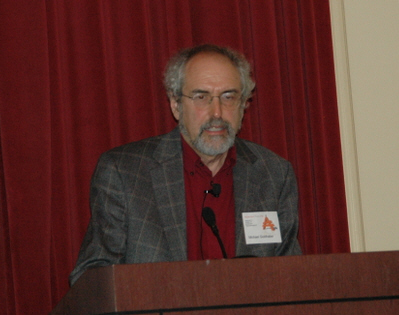Liveblogging Michael Goldhaber, 'the Einstein of Attention'

I'm here at an AttentionTrust luncheon, featuring a talk by Michael Goldhaber and some AttentionTrust and GestureBank related announcements. Dan Farber is here as well, so check his blog for related coverage (and his photos are included below). I will attempt to paraphrase and summarize the remarks from the speakers here, and provide my own commentary thereto where indicated. This post will cover Michael Goldhaber's portion of the talk, and the following one will cover related AttentionSoft and AttentionTrust announcements.
Comments from Michael Goldhaber: For humans, the desire for attention is primal and biological. As a human infant, if you don't get attention, you're dead. It's hard-coded into our parent-child dynamic. Context is also integral to attention. You create a little model of the story or person to whom you're paying attention, and you align with them. While you are so engaged, there is some sense in which you become them, but the way you do so depends on the context you have and bring to the relationship. Humans are incredibly interactive, don't like being hermits. There is a wonderful feeling that comes with alignment, and with having an audience of power. With attention, there is no limit to the number of peoples' attention you can get, if they exist. We all have at least potentially a love for attention that is unbounded in scope. For most of human history, it has been impossible to gain the attention of more than say, your village. Now, we have the potential of getting the alignment, which is to say the attention, of hundreds of millions of people. For the most part though, due to the scarcity of attention, that potential is not realized. When different, simultaneous actions are going on, you are not able to fully align with all those things at once. It's impossible to fully align when multitasking, unless some of the tasks involved don't actually require your full engagement. We want attention from people who are fully aligned with us. Modern technologies have created the potentiality, but not the actuality, of maximizing the potential of attention.

The main thing one has to be good at when seeking attention is offering something Michael calls "illusory attention." Illusory attention is what you do to somehow convince the viewer or listener that what you're up to is important. To them. It is the act of persuading people that you are paying enough attention to them that you're able to keep them fully engaged and aligned with what it is you're doing. You're not really individually paying attention to each member of the audience, but you give enough of the impression of doing so that the audience remains engaged. The other day, Michael's power went off. He called PG&E, got their voice activated phone tree. This is a very crude attempt at providing illusory attention. Another level occurs when a real person comes on the line and essentially pretends to be very concerned about your problem, while actually reading from a script and not being very focused on you or your problem at all. Web sites try to provide illusory attention by trying to provide the viewer or reader with some sense of control over the experience. Some sites collect data, then use that data to pretend to the collectees that the Web site actuallty knows who they are. If they can do this in a way that creates empathy, that creates a real feeling that you're getting attention, then it's effective. We're all used to this from sites like Amazon. This illusory attention strategy works right up to the point where the feedback you're receiving from your collected data is really stupid. Going back to Michael's PG&E call, if the recording had said something like, "I'm so sorry you're sitting there in the dark," it would have been a different experience, and a more complex application of illusory attention.
The old economy sees attention as a way of getting people to buy; attempting to persuade buyers that their attention potential will be maximized by the purchase. (Why you "need" the expensive watch, etc.) There is a new economy developing around attention itself, rather than as attention as means to an end. The question becomes: what do we do about it? In an attention economy, property is created, and can be reused. Michael owns the attention of the people in this room during this talk, and will own it again when and to the extent we call it up after the fact. [DMH: He owns your attention too, as you read this post.] This is all done without collecting any data about the audience. From an attention economic point of view, it's possible to be benefitted by uses of your data of which you do not approve. From this standpoint, there were involuntary positives for Paris Hilton when her infamous video was made public.
Questions and discussion prompted from the audience: a different kind of alignment is aligning with a group ("people who viewed this also viewed that"), but the expectations in this case are much lower. There may be no amount of group alignment with Britney Spears that could get you to click.
Is there less alignment when anonymity is part of the equation? It depends what is anonymized. Using the Britney Spears example, the individual identities of the members of the pool are irrelevant. Identifiable peculiarities don't matter, if you're inclined to be interested in something that the anonymized members of the group are also interested in.
Christopher Carfi asks about trust, and also the idea of future attention, is an opt-in or subscription a promissory note for future attention? Answering the last question first, if so it's a very weak one. It's an attempt to deal with the vast universe of information available and single yourself out in some way. Regarding the attention and trust connection, the more you pay attention to someone the more trust you are likely to have, but the reasons for trust must constantly be reiterated. Once you lose trust, it's very hard to regain, but the impact of being constantly visible works to deflect that somewhat.
How do we tie these economic considerations in with your primal instinct to attain your survival and other critical goals? Attention itself is something we all fundamentally need. Moreover, when others are aligned with you, they are invested in wanting what you want. So, to some degree, you get what you want by getting a sufficient amount of attention. This relates to the current economy in the sea change we have seen in people's incomes. People generate income from the people who pay them attention. Those who earn less money do so in some sense because they garner less attention. The potential of doing well without attention becomes harder and harder.
Seth Goldstein asks whether Google has a balanced attention budget. We all search using Google, so we're paying some attention. What we're finding are things Google is putting in our way. Michael says Google is giving you some illusory attention, which translates into their getting billions of dollars. We believe they're giving us attention, and they have to maintain that illusion in a constant arms race with competitors.
Mary Hodder comments that it's not always a quest for attention. Google gives you something other than attention in exchange for you giving them yours. Michael says this is a question of definition; he's trying to define the whole world in terms of attention which admittedly may be an artificial way to do it.